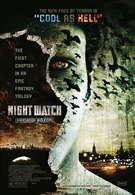Wizards, witches, psychics and vampires exist on Earth, split between two factions, the Light and the Dark. These factions roam the Earth unseen to all but a select few intuitive humans known as Others. Over a thousand years ago these forces came together in a massive battle. Seeing that neither side would win and that continuing the battle would result in total annihilation, the leaders of Light and Dark agreed on a truce – The Armistice. The Armistice decreed that no Other should be swayed between Light or Dark and that they must choose their own path. By allowing this “natural section” to exist, one side would eventually emerge victorious.
To protect the Armistice, the Watches were formed to police the opposing sides. The “Day Watch" of the Dark Others would watch over Light side and conversely the “Night Watch" of the Light Others would watch over the Dark.
But prophesies speak of The Great One, who one day would come forward and choose the side which would ultimately declare victory and some who have seen the future claim this Other will choose the side of Evil and plunge the world into Darkness forever.
Relax, if you think I’ve spoiled the movie for you, that simply my attempt to condense the pre-credit introduction from the most successful Russian movie in history into some kind of clear sense. To say that there is a lot to keep track of in Timur Bekmambetov’s proposed epic translation of Sergei Lukyankenko’s series of books is an understatement. If only Bekmambetov had better unraveled the tale to the audience we’d be dealing with a classic foreign movie instead of an entertaining little oddity.
The story proper opens as young Anton (Khabensky) visits a witch to exact revenge on his estranged wife. The witch also offers to kill her unborn child, whom she tells him is not his. Anton agrees, but the ceremony is interrupted by the Night Watch and Anton quickly discovers that he himself is an Other. Twelve years pass and Anton has joined the Night Watch. A rapidly unfolding series of events sees Anton pursued by a vampires out for revenge, preventing a funnel of destruction from wiping out the planet, and discovering that he himself may have something to do with the prophesy of the Great One. All in a day's work when you’re in “The Watch”.
The world of Night Watch is portrayed in a bizarre but not unfamiliar mixture of Blade and The Matrix. Modern day Moscow is pictured as a dark, cold, unfriendly place; free of the many clichés you might expect an American production to throw in to let you know where you are. Lots of Matrix comparisons will be drawn simply due to the cinematography and costume design, but it’s all superficial stuff that’s now expected in any movie portraying a dark, dank reality.
The characters are all quirky and interesting, from the fatherly Gesser, leader of the Light ones to Anton’s beady, owl shape-shifter partner Olga. They’re so good you’ll wish that they had a little bigger role to play in proceedings. Touched upon but never properly explored is Anton’s bizarre relationship with his neighbors – a family of unlicensed vampires.
Your Daily Blend of Entertainment News
The movie works best when it’s doing its own thing: being dark and slow burning. Where it all goes wrong is when it starts trying too hard to emulate the worst of Hollywood’s bad habits; all staggered grinding rock music, annoying jump-cuts, and some plainly bizarre ADHD editing. It was these same problems that plagued last year’s otherwise excellent Saw – a good movie let down by some bad directorial and editorial choices.
One of the biggest problems with Night Watch though is that it leaves far too much unexplained. Sure it could all be excused by saying that it’s part of a planned trilogy and that other aspects will be unveiled later. That’s fine if you are trying to create a mythology around something, like “What is the Matrix?”, but when the viewer is left sitting saying “What is going on?” and your director isn’t David Lynch, you know you’ve cut a scene or twelve that should’ve stayed in the final print. A potential explanation of The Funnel starts off as a surreal animated interlude suddenly abandons this vital thread and goes on to repeat what we had already been told in the introduction instead.
For all the negativity it might sound like I’m expressing, there is in interesting movie in here. Though it only cost $4 million it never looks cheap, production values are high and visual effects used effectively but sparingly. The core of the story is an old one but this take on it is interesting. None of the performances disappoint. Khamensky gives a good show as our protagonist, both still haunted by his slip into evil twelve years ago and trying to deal with the responsibilities, hypocrisies and dark revelations of being a field operative for the Night Watch. There are also some cool smaller moments, as in a scene where Anton must use a mirror shard to fight off a vampire that, ironically, can only be seen by his reflection.
With two installments supposedly left to go, Bekmambetov needs to stop trying to copycat Hollywood with his action sequences and tighten up his storytelling if he wants us to stick with it. While the Wachowskis might have been able to dress up plot holes and unexplained elements in cod-psychobabble, at least for them it worked. They gave you enough information to make their Matrix film’s plot understandable. Night Watch never really manages that. You can’t create mystique by short-changing the audience vital information, particularly of the kind that would let them relate to what is going on. Doing so just leaves us all confused and alienated. That’s the kiss of death, no matter where in the world you live.

